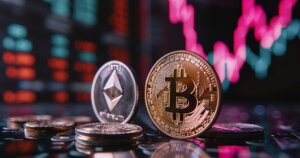 Coinbase pushes DeFi narrative by considering listing Balancer, Curve, and AMPL
Coinbase pushes DeFi narrative by considering listing Balancer, Curve, and AMPL Coinbase pushes DeFi narrative by considering listing Balancer, Curve, and AMPL

Cover art/illustration via CryptoSlate. Image includes combined content which may include AI-generated content.
Coinbase has become the latest company to join in on the DeFi craze by announcing potential listing 19 new digital assets on its platform. According to the company’s press release, popular DeFi protocols such as AMPL, Balancer, Curve, and WBTC could soon be added to Coinbase if they meet the exchange’s rigorous compliance framework.
More DeFi protocols could be coming to Coinbase
The incredible growth seen in the DeFi space has made the burgeoning new sector attractive to even the most conservative companies in the crypto industry. Coinbase, one of the largest and most heavily regulated cryptocurrency exchanges in the industry, has joined in on the DeFi craze and is considering adding many new projects to its platform.
According to the company’s blog post, Coinbase is currently considering adding 19 new cryptocurrencies to its exchange platform. And while new additions are nothing new for an exchange of Coinbase’s size, the fact that most of the coins it’s considering adding the near future are DeFi tokens is news-worthy.
Projects such as Balancer, Curve, WBTC, AMPL, and tBTC could get listed on Coinbase if they manage to meet the company’s technical standards and comply with applicable laws, the company said in its blog post.
DeFi tokens might soon benefit from the Coinbase effect
Aside from the four previously mentioned projects, Coinbase is also considering listing Ampleforth, Band Protocol, Blockstack, Curve, Fetch.ai, Flexacoin, Helium, Hedera Hashgraph, Kava, Melon, Ocean Protocol, Paxos Gold, Reserve Rights, The Graph, THETA, and UMA.
All of these tokens could potentially benefit from the so-called “Coinbase Effect,” in which cryptocurrency projects that get listed on the exchange experience a significant surge in growth immediately after trading opens.
While this could have a short-term negative impact, causing major volatility for the tokens, the projects could see long-term benefits from being listed on a platform as big and as well-regulated as Coinbase.
The company noted that some of its customers might start noticing public-facing APIs and other signs that engineering work was being done on the platform. This will be a temporary nuisance as the company works on introducing support for these assets, Coinbase said in the blog post.
Nonetheless, even if the company decides to list these projects, it might not be available to all of Coinbase’s users. Due to different regulations in various regions where Coinbase operates, all of the tokens that do get listed will roll out on a jurisdiction-by-jurisdiction basis.
Mentioned in this article
 Balancer
Balancer  Wrapped Bitcoin
Wrapped Bitcoin  Ampleforth
Ampleforth  Band Protocol
Band Protocol  Stacks
Stacks  Flexacoin
Flexacoin  Helium
Helium  Hedera
Hedera  Kava
Kava  Enzyme
Enzyme  Ocean Protocol
Ocean Protocol  PAX Gold
PAX Gold  Reserve Rights
Reserve Rights  UMA
UMA  Theta
Theta  Coinbase
Coinbase 



 Arkham Intelligence
Arkham Intelligence 

 Farside Investors
Farside Investors 
 CryptoQuant
CryptoQuant 
 CoinGlass
CoinGlass 























































































































